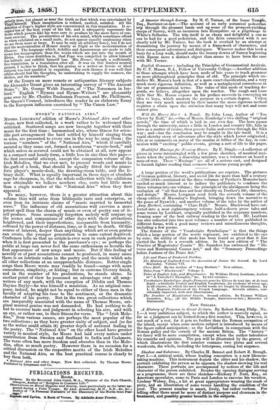ISOORE'S NATIONAL AIRS.*
MESSRS. LONGMANS' edition of Moore's National Airs and other Songs, now first collected, is a work rather to be welcomed than criticized. Scattered songs are now brought together with their music for the first time ; harmonized airs, whose fitness for scien- tific part arrangement the bard settled by himself singing them as solos, are presented to every one in the way he sang them ; the various " numbers " of the " National Airs," which if carefully secured as they came out, formed a cumbrous "music-book," and which unless so secured could not be obtained at all, now appear in a compact and handy form, a little less in size than this page—. the first successful attempt, except the companion volume of the Irish Melodies, that we ever met, to present words and music in the garb of a book, that should be equally fitted for the piano- forte player's music-desk, the drawing-room table, and the li- brary shelf. What is equally important in these days of absolute rage for cheapness, is, that the whole collection with the additions now obtainable we believe nowhere else, costs but little more than a single number of the "National Airs" when they first appeared. To many, however, there is a greater attraction about this volume than will arise from bibliopolic taste and enterprise, or even from its intrinsic claims of " music married to immOrtal verse." The influence of old associations will exercise a more potent spell than the charm of music or even of poetry can of it- self produce. Some seemingly forgotten melody will conjure up the scenes and companions of other days with their attractions heightened, and their imperfections, inseparable from humanity, softened by the power of distance, time, or it may be death. Of this source of interest, deeper than anything which art or even genius can create, the younger generation is to some extent deprived. Craftsmen tells us that no article is ever seen in such perfection as when it is first presented to the purchaser's eye ; so perhaps the public at large can never feel the same enthusiasm as heralds the first appearance of new songs and music. But if this feeling of novelty or of past associations cannot be produced, in many cases there is an intrinsic value in the poetry and the music which sets all other collections at an unapproachable distance. Better single songs than Moore wrote may readily be found—songs with more earnestness, simplicity, or feeling; but in extreme literary finish, and in the number of his productions, he stands alone. In another point of view he possessed an advantage over all song- writers of any mark, with the exception of Dibdin and Thomas Haynes Bayly—he was himself a musician. As an original com- poser, indeed, he might not be equal to either of these men in the faculty of adapting his tune to the sentiment, or the dramatic character of his poetry. But in the two great collections which are inseparably associated with the name of Thomas Moore, ori- ginal musical genius was not demanded. He had nothing to do but to exercise taste and judgment in selecting his airs, and with an eye, or rather ear, to their fitness for verse. The " Irish Melo- dies," from various causes, are perhaps the most popular of the two collections ; as they have greater unity of subject, and (so far as the writer could attain it) greater depth of national feeling in the poetry. The " National Airs" on the other hand have greater variety in musical style, for Moore had laid every nation under contribution from Sweden and Scotland to India and Cashmere. The verse often has more freedom and abandon than in the Melo- dies, often as much poetry. However there is no occasion for a critical discussion on the respective merits of the Irish Melodies and the National Airs, as the best practical course is clearly to buy them both. _ • National Airs and other Songs. Now first collected. By Thomas Moore. Published by Lana-mans and Co.


































 Previous page
Previous page